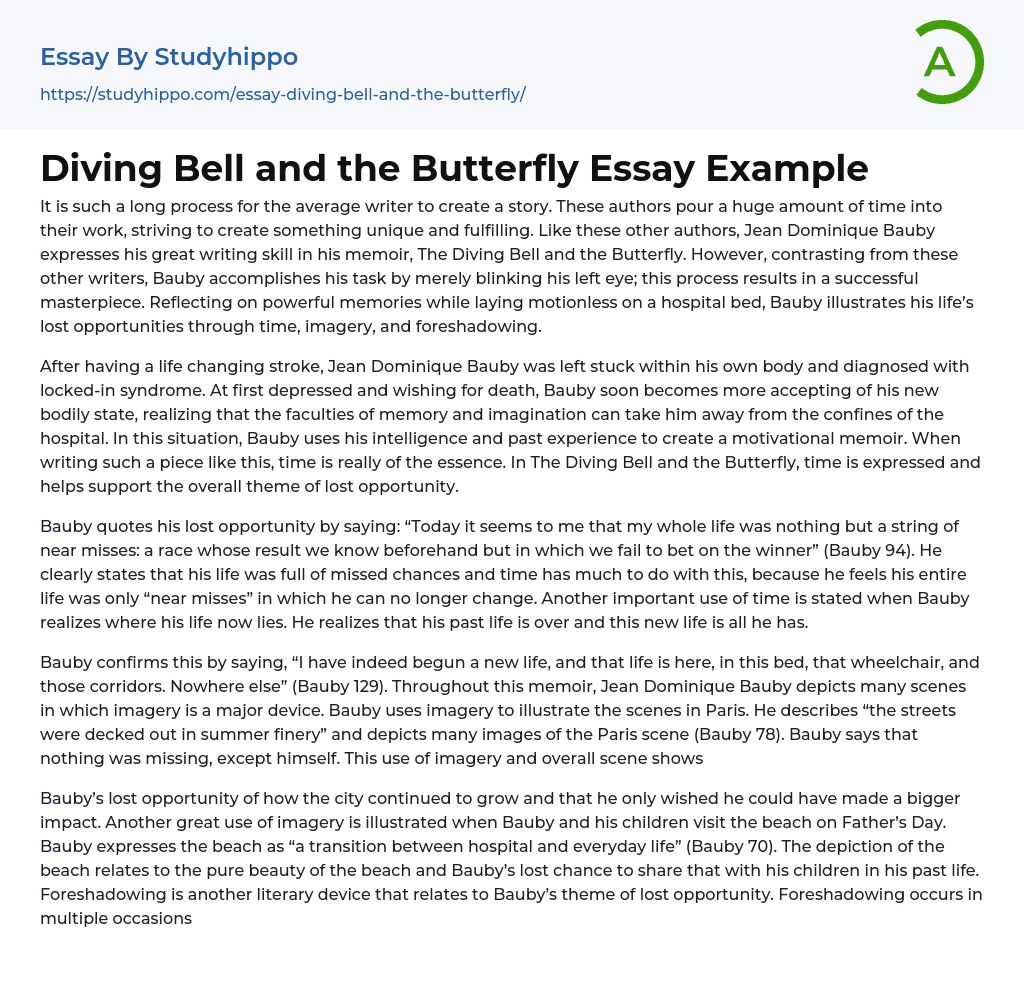It is such a long process for the average writer to create a story. These authors pour a huge amount of time into their work, striving to create something unique and fulfilling. Like these other authors, Jean Dominique Bauby expresses his great writing skill in his memoir, The Diving Bell and the Butterfly. However, contrasting from these other writers, Bauby accomplishes his task by merely blinking his left eye; this process results in a successful masterpiece. Reflecting on powerful memories while laying motionless on a hospital bed, Bauby illustrates his life’s lost opportunities through time, imagery, and foreshadowing.
After having a life changing stroke, Jean Dominique Bauby was left stuck within his own body and diagnosed with locked-in syndrome. At first depressed and wishing for death, Bauby soon become
...s more accepting of his new bodily state, realizing that the faculties of memory and imagination can take him away from the confines of the hospital. In this situation, Bauby uses his intelligence and past experience to create a motivational memoir. When writing such a piece like this, time is really of the essence. In The Diving Bell and the Butterfly, time is expressed and helps support the overall theme of lost opportunity.
Bauby quotes his lost opportunity by saying: “Today it seems to me that my whole life was nothing but a string of near misses: a race whose result we know beforehand but in which we fail to bet on the winner” (Bauby 94). He clearly states that his life was full of missed chances and time has much to do with this, because he feels his entire life was only “near misses” in which he can
no longer change. Another important use of time is stated when Bauby realizes where his life now lies. He realizes that his past life is over and this new life is all he has.
Bauby confirms this by saying, “I have indeed begun a new life, and that life is here, in this bed, that wheelchair, and those corridors. Nowhere else” (Bauby 129). Throughout this memoir, Jean Dominique Bauby depicts many scenes in which imagery is a major device. Bauby uses imagery to illustrate the scenes in Paris. He describes “the streets were decked out in summer finery” and depicts many images of the Paris scene (Bauby 78). Bauby says that nothing was missing, except himself. This use of imagery and overall scene shows
Bauby’s lost opportunity of how the city continued to grow and that he only wished he could have made a bigger impact. Another great use of imagery is illustrated when Bauby and his children visit the beach on Father’s Day. Bauby expresses the beach as “a transition between hospital and everyday life” (Bauby 70). The depiction of the beach relates to the pure beauty of the beach and Bauby’s lost chance to share that with his children in his past life. Foreshadowing is another literary device that relates to Bauby’s theme of lost opportunity. Foreshadowing occurs in multiple occasions while also tying in with the theme of lost opportunity.
Bauby always had the idea of creating a novel about a man with locked-syndrome, which is quite ironic and a bit of foreshadowing due to the fact that this is his same condition. The lost opportunity deals with the writing of his novel. Another instance
of foreshadowing occurs a week before Bauby’s stroke. Bauby helps his old-aged father to shave his face because his father can no longer do so without assistance. After Bauby’s stroke when he can no longer shave himself, he says, ““Now I am the one they shave every morning, and I often think of him while a nurse’s aide laboriously scrapes my cheeks with a week-old blade” (Bauby 45).
This bit of foreshadowing also reflects upon the lost opportunity of Jean Dominique and his father’s relationship. The Diving Bell and the Butterfly is filled with rhetorical devices in which really point out the overall theme of lost opportunity and missed chances in Bauby’s past life. While reflecting on past memories and with his wide imagination, Bauby uses time, imagery, and foreshadowing to express exactly how he has missed out on opportunities.
- Book Summary essays
- Metaphor essays
- Reader essays
- Rhyme essays
- Literary devices essays
- Villain essays
- Books essays
- Genre essays
- Literary Criticism essays
- Writer essays
- Protagonist essays
- Simile essays
- Poem essays
- Book Report essays
- Book Review essays
- Greek Mythology essays
- Plot essays
- Tragic Hero essays
- Coming of Age essays
- Play essays
- Rhetoric essays
- Rhetorical Question essays
- Translation essays
- Understanding essays
- Reason essays
- Character essays
- Letter essays
- American Literature essays
- Literature Review essays
- Utopia essays
- Poetry Analysis essays
- Dante's Inferno essays
- Between The World and Me essays
- Incidents in The Life of a Slave Girl essays
- Flowers for Algernon essays
- Myth essays
- Everyday Use essays
- Boo Radley essays
- Genesis essays
- Richard iii essays
- Alice in Wonderland essays
- On the road essays
- Ozymandias essays
- The Nightingale essays
- Holden Caulfield essays
- Animal Farm essays
- 1984 essays
- A Hanging essays
- Shooting An Elephant essays
- A Tale Of Two Cities essays




